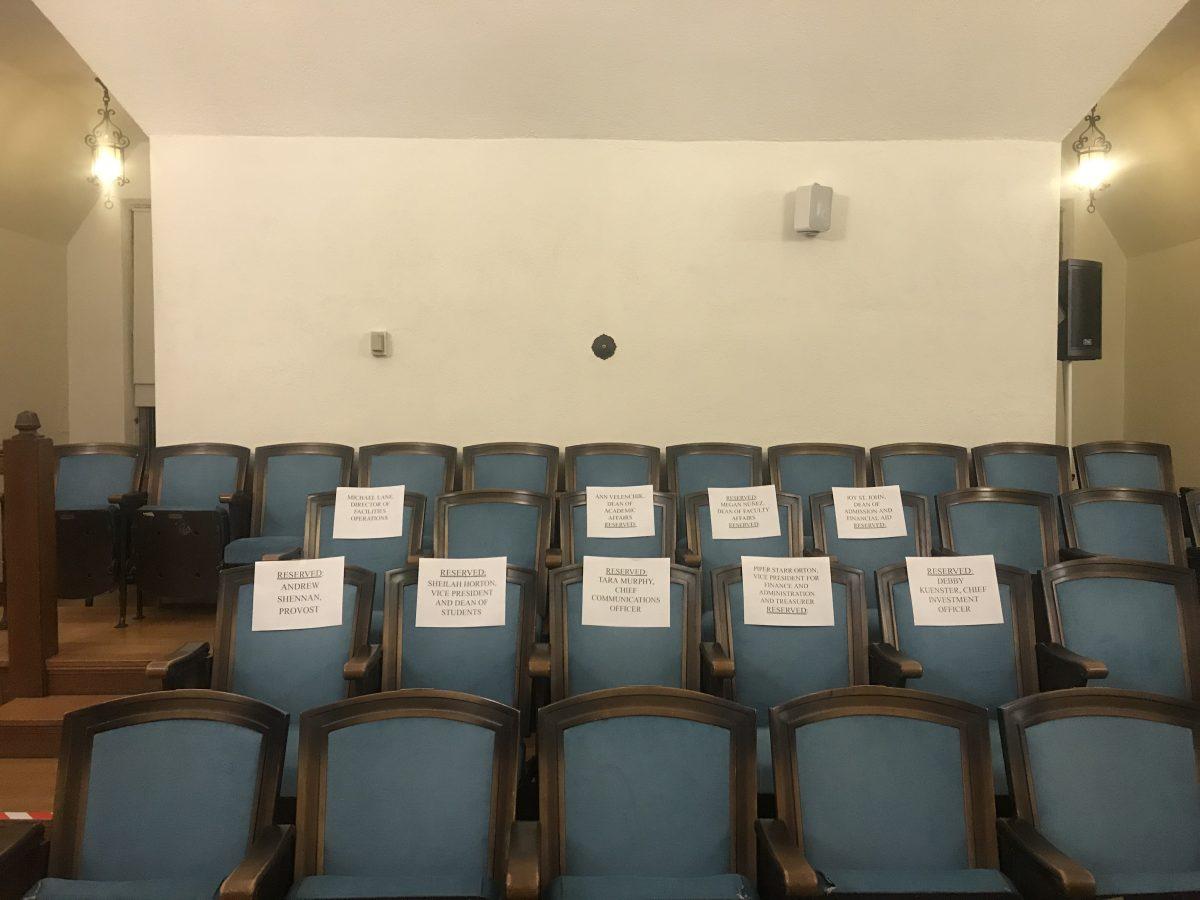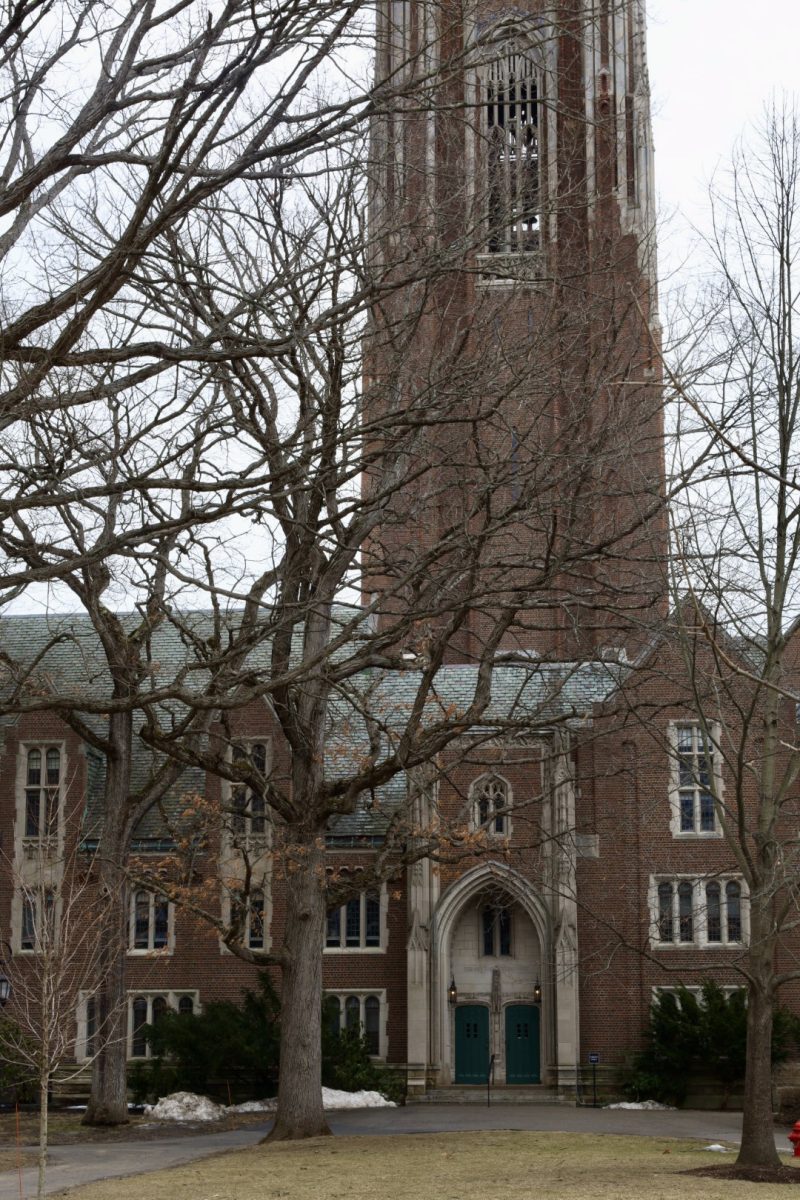On the morning of Monday Sept. 23, the recently formed Student Coalition at Wellesley College emailed all students and administrators a letter addressed directly to senior staff in order to invite them to a town hall. The event, scheduled for Sept. 25 in the Academic Council Room, was meant to be a forum for students to express their concerns over a variety of issues regarding campus life such as housing, health services and general well-being. At 7 p.m. that Wednesday night, a crowd of approximately 150 — comprised mostly of students, as well as a handful of faculty, administrators and alumnae — gathered, but the chairs reserved for the invited upper administration officials remained unmistakably empty. Several minutes after the event was set to begin, an emailed statement from Sheilah Horton, Vice President and Dean of Students, announced that members of upper administration would no longer be attending the town hall.
Horton said in the announcement that members of the senior administration originally planned to attend the town hall. However, they reconsidered after learning that morning that the event would be livestreamed to a private Wellesley student and alumni Facebook group. The statement reads in part, “We are concerned that having students share personal stories in such a forum is not in their best interest or in the best interest of the College.”
After acknowledging the administration’s concern by reading the email aloud, the Student Coalition proceeded to livestream the event to said closed Facebook group, which was created for alumnae and students to communicate with each other and crowdsource solutions to issues that they believe the College is facing. Members of the Student Coalition maintains that there were students and community members who could not attend the town hall and that there was a designated space outside of the camera’s frame for those who did not want to be recorded.
“We also understand the concerns regarding privacy and social media,” said Katie Christoph ’21, one of the event organizers, during her opening remarks. “But our obligation was to not only the students in the room … but the wider community, and to those ends we carried through with [livestreaming the event].”
Throughout the town hall, students shared personal stories on numerous topics, such as housing and financial services, concerning campus life. Each topic was introduced by the moderators with a list of potential solutions that had been previously discussed in smaller, student-only meetings over the past week. Each issue was then followed by an open forum in which attendees could share. According to Tyler Vargas ’21, another event organizer, issues with housing acted as the catalyst for the formation of the Student Coalition, which has since expanded to advocate for student well-being in other arenas, such as healthcare and dining plan options.
In an anonymous statement read by the Student Coalition, a recent alumna shared her experience with alleged mold in Lake House, which she presumed to have led to a drastic cough. She explained that Health Services tested her cough, diagnosed her with whooping cough, and put her in quarantine for a week until she was cleared by the Center for Disease Control. After being cleared, she returned to her room, which according to the alumna had still not been tested for mold. While this instance was not confirmed by anyone in Health Services or administration, other students expressed similar concerns over the presence of mold in their rooms.
Another campus issue that was discussed intensely in the town hall was the treatment of the dining staff at Wellesley. The conversation follows in the wake of the recent agreement between the College and Independent Maintenance and Service Employees Union of America (IMSEUA), which among other things, lowered the pay and benefits for incoming dining staff. This most recent agreement has been described by some union members as “the best of the worst.”
The Student Coalition said that they had reached out to several IMSEUA members and that a number expressed support and interest, but none could be in attendance. “Staff are terrified of any potential retaliation from administration,” Tatiana Ivy Moise ’21, another student organizer, said. “They are afraid that they are going to lose their jobs because they step into this room.”
The Wellesley News reached out to President Paula Johonson regarding her absence from the town hall. “I am always open and eager to meet with students and hear about their experiences and concerns,” said President Paula Johnson in an email statement. “We all want to build a better Wellesley, with students at the center. I look forward to continuing to work with students and the broader community to strengthen the College we love.”
In a follow-up email to the Wellesley News, Dean of Students Sheilah Horton maintained that a livestreamed event “is not conducive to an open, honest, generative conversation. She added that she sent the original email announcing senior administration’s absence from the town hall so their “absence would not be misunderstood to be apathy.” Neither she nor other senior staff members had access to the Facebook group where the event was livestreamed, so they could not watch the town hall online.
Despite multiple interview requests, Vice President and Treasurer Piper Orton could not be reached for comment.
Several members of the administration were in attendance including Director of Residential Life Helen Wang, who defended the senior staff’s absence, explaining, “I know that the administration really cares and I think we want to preserve the integrity of student stories.”Also in attendance was Director of Media Relations Casey Bayer.
Several students who spoke with the Wellesley News following the town hall expressed frustration that senior administration did not attend. Charnelle Jones ’23 said, “I’m really struck by the fact that [upper] administration didn’t show up… It’s interesting that they didn’t want to come and face the music of what that collaborative group of students has to say.”
“The fact that the administration isn’t here is so disappointing but also so telling,” added Thayer Wilson ’23, another first year attendee.
At the end of the event, the Student Coalition announced that there would be a second town hall at a later date. Though the town hall ran 30 minutes over schedule, the majority of attendees stayed to hear the last student stories. The Student Coalition concluded by thanking the audience for their attendance and contributions to the event.
“This room right here is Wellesley and this is what Wellesley does,” Moise said. “This is what Wellesley has always done.”
Correction: A previous version of this article stated that Dean of Admissions Joy St. John was in attendance when she was not actually there.






